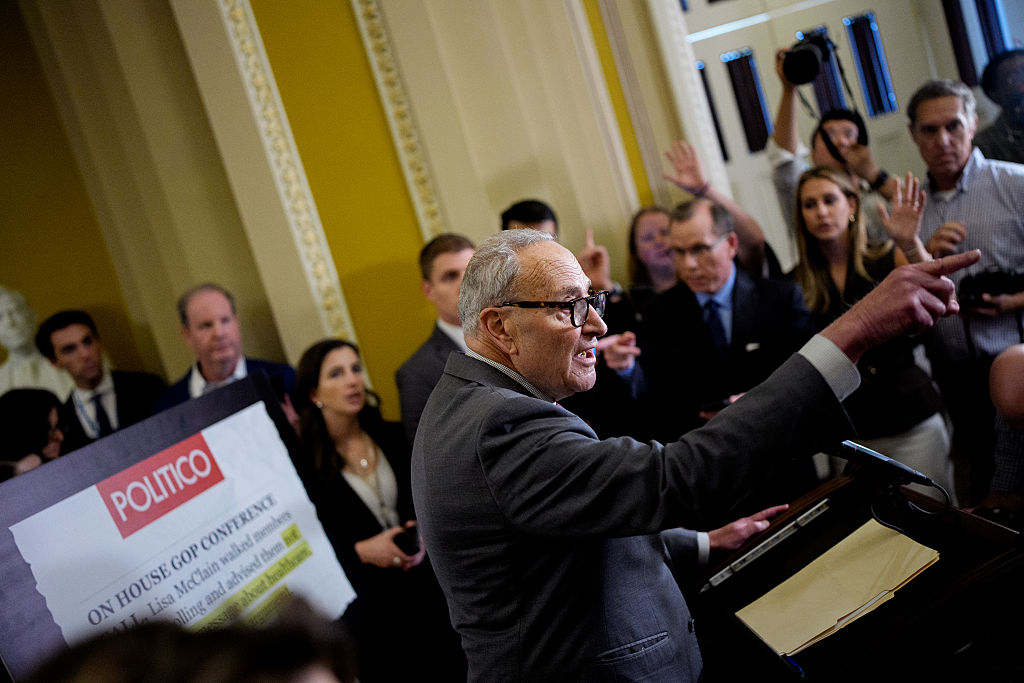Here’s Where We Are In The Current Government Shutdown

Last week, the federal government shut down after Democratic and Republican legislators couldn’t come to terms on a bill that would fund the government into October through the rest of the year. Here’s everything we know so far about what caused the shutdown, how it affects you, and how long it could be expected to last.
Why did the government shut down?
While Republicans have a majority in the House and Senate, spending bills need 60 votes in the Senate to pass. Republicans currently control the Senate 53-47, which gave Democratic senators the rare opportunity to leverage some negotiating power.
One major sticking point for congressional Democrats is the ending of COVID-era subsidies for Affordable Care Act (ACA) plans. These subsidies greatly reduced premiums for millions of Americans and documented migrants. At a time when the cost of living is already causing a large number of people to live paycheck to paycheck, and with prices continuing to rise as a result of President Donald Trump’s erratic tariff policy, you’d think the Republican Party would at least try to take credit for keeping health care costs low.
Instead, they’ve elected to frame the issue as Democrats wanting to extend free, federal health benefits to undocumented immigrants. Despite that being illegal, and despite there being no language in the subsidies providing benefits for undocumented folks, most Republicans are dead set on making that the narrative.
What happens during a government shutdown?
NewsOne’s Zack Linly has gone into greater detail about the ins and outs of a government shutdown, as did Shannon Dawson, so I’ll keep it brief.
Basically, in a government shutdown, the majority of federal employees are furloughed and expected to work without pay until a new spending bill can be approved. Government employees deemed “essential” will still be paid, but it’s up to the federal government to determine who is and isn’t essential. While the day-to-day workers within the federal government are expected to work without pay, all members of Congress will continue to receive paychecks.
Funny how that works.
Has the government shut down before?
Yes. In fact, it seems like every six years the government shuts down. Much like our current shutdown, the 2013 government shutdown was about the ACA. The Republicans submitted a budget proposal that was intended to delay and drastically reduce funding for the ACA, which then President Barack Obama and congressional Democrats obviously pushed back against. The shutdown lasted for 16 days and eventually ended with a spending bill that kept funding for the ACA intact.
The 2018-2019 government shutdown was the longest in U.S. history, lasting 35 days. The shutdown was due to President Donald Trump wanting billions in congressionally approved funds for a wall around the U.S.-Mexico border. Trump initially refused to sign any funding bill that didn’t have the funding for the wall. The shutdown ended when Trump caved to mounting pressure from his own party after the government shutdown led to significant travel delays. Trump eventually signed a spending bill that didn’t have the funds for the border wall.
How does a government shutdown affect me?
One of the most notable ways a government shutdown can affect you is through air travel. We’re only one week into the shutdown, and the FAA is already seeing an uptick in air traffic controllers calling in sick. There’s already a shortage of air traffic controllers, and the sick leave uptick has resulted in flight delays, with the Hollywood Burbank Airport having no working air traffic controllers on Monday.
Social security and Medicaid checks will continue to be dispersed, but food assistance programs and federally supported preschools and day cares are expected to be reduced, if not closed.
If you’re employed by the federal government, you’re already aware that you’re expected to work without pay. While historically, furloughed federal employees are given back pay, President Donald Trump has signaled that not all federal employees will receive back pay.
“I would say it depends on who we’re talking about,” Trump told reporters on Tuesday. “I can tell you this: The Democrats have put a lot of people in great risk and jeopardy, but it really depends on who you’re talking about. But for the most part, we’re going to take care of our people. There are some people that really don’t deserve to be taken care of, and we’ll take care of them in a different way.”
In usual Trump fashion, he did not elaborate on what he meant by the last part.
This tactic could be a ploy by President Donald Trump to encourage federal workers to quit as part of his ongoing effort to drastically reduce the size of the federal workforce. Trump has also said the government shutdown provides an “unprecedented opportunity” to lay off workers and shutter several programs and initiatives that don’t align with his agenda.
Will the shutdown end soon?
Negotiations have stalled between Democrats and Republicans, with bills to fund the government continually failing to gain the necessary votes in the Senate. President Donald Trump did signal to reporters on Monday that he was open to extending ACA subsidies “if we made the right deal,” but he didn’t go into further detail on what would make “the right deal.”
Analysts have said the upcoming Oct. 15 pay period for the military could put pressure on both sides to get a deal done. “We believe the military pay date on Oct. 15 could be an important forcing event for a compromise to restore funding and expect the shutdown to end by mid-October,” Goldman Sachs economists Ronnie Walker and Alec Phillips said in a client note.
With President Donald Trump wanting to deploy the National Guard into Democrat-led cities left and right, a missed pay period could significantly hurt the already dwindling morale of those deployed.
Still, prediction markets show that 71% of investors believe the shutdown will go past the Oct. 15 date and quite possibly into November. While Republicans have tried to pin the government shutdown on the Democrats, recent polling shows the majority of Americans believe the Republicans are to blame. Should this go on, and Americans see more and more travel disruptions as the holidays approach, this could be a significant blow for the Republican Party ahead of the 2026 midterms – especially considering that if the Republicans get what they want, it means insurance premiums will spike for millions of Americans.
SEE ALSO:
Explaining The Hatch Act: When Government Agencies Go Too Far In Political Messaging
In Shutdown, Trump Praises Project 2025 Lead As Health Care Cuts Loom
Here’s Where We Are In The Current Government Shutdown was originally published on newsone.com











